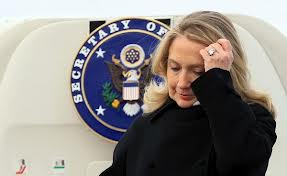 The United States indicated on Wednesday that it was undertaking its most aggressive attempt yet to reshape the Syrian opposition, with Secretary of State Hillary Rodham Clinton dismissing the current leadership as a bunch of out-of-touch exiles who should be replaced with a group more representative of the fighters on the ground.
The United States indicated on Wednesday that it was undertaking its most aggressive attempt yet to reshape the Syrian opposition, with Secretary of State Hillary Rodham Clinton dismissing the current leadership as a bunch of out-of-touch exiles who should be replaced with a group more representative of the fighters on the ground.
“There has to be representation of those who are on the front lines, fighting and dying today to obtain their freedom,” Mrs. Clinton told reporters during a trip to Croatia. “This cannot be an opposition represented by people who have many good attributes, but have, in many instances, have not been inside Syria for 20, 30 or 40 years.”
Hundreds of opposition figures are gathering in Doha, Qatar, next week to try to form such a group — ostensibly under the auspices of the Arab League but really pushed there by the United States. Mrs. Clinton said she had been heavily involved in planning the meeting, including recommending individuals and organizations to include in any new leadership structure.
“We’ve made it clear that the S.N.C. can no longer be viewed as the visible leader of the opposition,” Mrs. Clinton said, referring to the Syrian National Council. It can participate, she added, “but that opposition must include people from inside Syria and others who have a legitimate voice that needs to be heard.”
Although council members are likely to have up to one third of the seats on the new body, which is expected to have 35 to 50 members, Mrs. Clinton’s very public announcement could well be the council’s death knell. “The S.N.C. has been over with for a long time now; fighters only talk about it sarcastically,” said Khaled Youssef al-Aboud, a pilot in northeast Syria.
The Obama administration has been exasperated for months with the anemic leadership and constant bickering of the council, which is often far more caught up in fighting over spots on travel delegations than in creating an effective transitional government. It failed to attract significant representation from minority groups, including the Alawites who dominate Syria as well as the Christians or the Kurds. Its obscure academics and long-exiled activists also seem increasingly irrelevant in a civil war in which extremist jihadis are gaining more visibility.
From the beginning, the council was seen as a prime vehicle for the long-exiled Muslim Brotherhood, backed by Turkey, and Mrs. Clinton said it was not inclusive enough and too accommodating of extremists.
“There needs to be an opposition leadership structure that is dedicated to representing and protecting all Syrians,” she said. “And we also need an opposition that will be on record strongly resisting the efforts by extremists to hijack the Syrian revolution.”
The timing of the Qatar meeting that could produce the change is interesting since the announcement is anticipated for next Wednesday, a day after the American presidential election, so the outcome of the attempt will not become an election issue.
Although no great shift in policy is anticipated no matter who wins the election, some analysts are expecting that the United States could become more deeply involved by supplying weapons, including antiaircraft weapons, to the opposition. Thus far it has insisted it was supplying only nonlethal aid, although it has been directing weapons from other states to favorite groups.
“They are hoping that some new body will emerge that they can work with, that they can recognize and that they can insert inside,” said Amr al-Azm, a Syrian academic in the United States who has long been a critic of the council.
“It will also ratchet up the pressure on the regime,” he added. “At the moment it is all moving at a snail’s pace. There is a stalemate on the political front and on the battle front.”
On Wednesday, the Syrian government was deploying its air force heavily against rebel strongholds in the north of the country and in the Damascus suburbs in what the opposition called a failed attempt to dislodge it from smaller towns it had captured.
Although the United States and its partners are trying to extract military commanders from Syria for the Qatar meeting next week, there was no guarantee that the overall effort would succeed. Previous attempts to create a more unified, more representative opposition have ended in spectacular failure, with a similar meeting in Cairo last June descending into acrimonious shouting and fisticuffs.
This week council members and other opposition activists fired the first shot over the bows against the Qatar meeting. One influential activist suggested Washington wanted to recreate its success in forming a friendly government in Baghdad after the 2003 invasion. The Damascus Declaration, a group of mainly secular leftists on the council, accused the United States of abandoning it because it refused any compromise with the government in Damascus. “We are against any new political entity that becomes subject to the agendas of foreign countries,” said Samir Nachar, one member.
Their statement said that it was too early for a transitional government because opposition territorial gains thus far had been “negligible,” with no safe zone, and that there was a potentially explosive lack of coordination among the various political, military and activist groups. Finally, it said that the need for a transitional government warranted further study.
Several of the failings, particularly the final one, were those for which foreign governments blame the council, whose members have been fighting to undermine the decision at the failed Cairo conference to form a committee on creating a more representative opposition organization. “The S.N.C. ship is holed, and now they are fighting over the lifeboats,” Mr. Azm said.
NY Times

Leave a Reply
You must be logged in to post a comment.